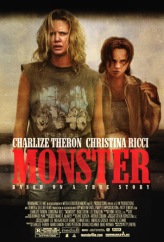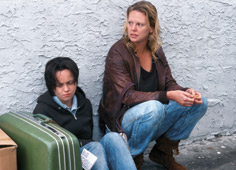| Monster |
| |
 |
USA, 2003. Rated R. 110 minutes.
Cast:
Charlize Theron, Christina Ricci, Bruce Dern, Annie Corley, Scott Wilson, Pruitt Taylor Vince, Lee Tergesen
Writer: Patty Jenkins
Original Music: "BZ"
Cinematography: Steven Bernstein
Producers: Charlize Theron, Mark Damon, Clark Peterson, Donald Kushner, Brad Wyman
Director: Patty Jenkins
LINKS
|
 ubject is likely to be a white male in his thirties or forties, relatively quiet and keeps to himself. Does the profiler in the serial-killer movie ever come up with anything different?
ubject is likely to be a white male in his thirties or forties, relatively quiet and keeps to himself. Does the profiler in the serial-killer movie ever come up with anything different?
Monster's Aileen Wuornos didn't fit the profile. Executed in 2002 for a string of murders committed between 1989 and 1990, the Florida prostitute is one of the few (some say the first) documented female serial killers in the United States.
The fact that serial killers are almost always men raises difficult questions about the male psyche, but we can at least guess what the possible sources might be—testosterone, the need to dominate or control, aggressive rage, etcetera. What circumstances could drive a woman down a similar path is much more difficult to imagine. Chemical imbalance? Desperation? Childhood abuse? Most of Wuornos' victims were her johns. Is that old standby, Society, then to blame for incubating this female psychopath?
Monster has the opportunity to comment on some interesting questions, in addition to the portrayal of a most unusual person. So what does Monster have to say? Essentially, it says:
“Look at me! I'm Charlize Theron! I've gained thirty pounds! I'm wearing ugly person makeup and false teeth! I spit and belch and act like a redneck! Betcha don't recognize me, huh? P.S., I'd like to thank the other nominees; I've lost the weight again, and my agent is standing by. I'd love to star in your Big Drama!”
Theron is right. She is unrecognizable. The former model (in her native South Africa)—and one of the most perfectly formed human beings to grace the screen—is nowhere in evidence. But is what she has become more character or caricature? It is difficult to say, without reviewing extensive footage of the real Aileen Wuornos, which is a research assignment beyond the scope of a simple movie review. However, the fact that the question can even be asked distracts from what is supposed to be the focus of the film. Theron's performance grabs more attention than the story, and therein lies the problem with Monster.

Christina Ricci and Charlize Theron run away together in Monster |
The fault does not lie with director Patty Jenkins's solid screenplay. She has built the film around a love story as unusual as the phenomenon of a female serial killer. After some opening thoughts from Wuornos spoken over flashback scenes of abuse (she was always attracted to anyone who thought she was beautiful; she would escape into her own imagination when things became unbearable), the film opens with the sodden Wuornos entering a bar that she does not at first realize caters to homosexuals. The audience's first thought is not, “Who has she become? Why is she here?” Instead, it is, “Is she wearing prosthetics?” (Answer: except for the false teeth, no.)
In the bar, Wuornos meets shy Selby Wall (Christina Ricci), a sheltered girl from Ohio whom Wuornos initially dismisses as a “dumb dyke.” Wall's meek niceness prevails, and a relationship develops—an extremely dysfunctional relationship in which Wuornos plays the sometimes-abusive “male” provider and Wall the seemingly helpless “female” manipulator. Their initial courtship, however, is tender and sweet. They visit a skating rink, and finally make out to the sounds of Journey (very similar to a moment in Lukas Moodysson's excellent Show Me Love, except he uses Foreigner).
Wall pushes Wuornos back into prostitution because they have no money and no other way of getting it. Shortly thereafter, Wuornos murders a john attempting to brutally rape her. It's self-defense, but Wuornos doesn't stop there. Now every john is a manifestation of violence against women who triggers her rage. Especially chilling is how Wuornos works herself up to murder with the victim helplessly standing by. Equally unsettling are her rationalizations to Wall.
Some will object to attempts to humanize Wuornos as a way to dismiss what she did, but she was a real person—a human being just like the rest of us—with a story that explains how she became who she was. Jenkins's script offers a realistic, believable explanation, which is not the same thing as an excuse (as much as some might like to confuse the two).
Unfortunately, Theron undermines that believability and realism. Her performance is best characterized as a representation of Wuornos, not a re-creation. It may be a faithful and undoubtedly difficult representation, but it remains a superficial one. Theron, with her hick accent, her exaggerated swagger, and the permanent plumber-hiking-up-his-pants grimace affixed to her face, inhabits her character's skin without inhabiting her soul. Desperation? Check. Need for love? Check. Profound anger? Check. An authentic individual as opposed to a broad portrayal of general concepts? Not so much. It takes more than mimicry to bring a human being to life.
The two-dimensional nature of Theron's performance is even more obvious when contrasted with Ricci's fine work. She doesn't wear makeup to change her appearance—all she has is an unattractive haircut. Yet she unquestionably becomes her character, and because she doesn't worry about imitating a plethora of mannerisms and postures, there is room for subtlety in her performance. No room for that with Theron.
Theron and Jenkins should have worried less about reproducing Wuornos physically and more about who she was on the inside. The script contains the necessary raw material, but Theron, laboring so very hard under layers of face paint and extra body fat, fails to use those words to reveal fully the nuances and contradictions of her character—all those things that make us human.
The business of making films dictates that Monster probably could not have been made without Theron's participation (she also produced and championed the project). That's a pity, because Monster would have benefited from casting someone a little closer, physically, to the original Wuornos. Instead, Theron's Herculean effort to become Wuornos has become the focus of the film's marketing and press attention, which means that Monster will leave people thinking more about Theron (“She looks so different! What courage! What fearlessness!”) than about the actual subject of the film. Theron has talent—she has done consistently solid work (The Cider House Rules, Devil's Advocate ) despite a reputation, initially, as just another pretty face—and the fact that she is able even to effect such a transformation on a superficial level suggests considerable capabilities. Theron may even win the Oscar. But is Monster about Wuornos' transformation into a serial killer, or Theron's transformation into Wuornos?
[Read the AboutFilm interview with Charlize Theron]
Review
© January 2004 by AboutFilm.Com and the author.
Images © 2003 Newmarket Films, LLC. All Rights Reserved.


